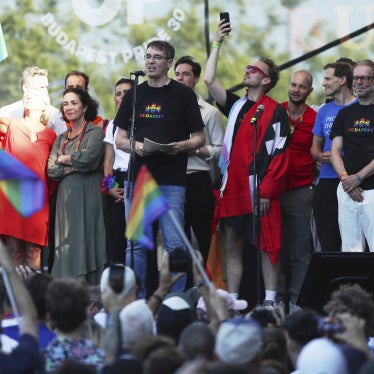Every year, a European city hosts Europride, an international event dedicated to lesbian, gay, bisexual, and transgender (LGBT) pride. This year it was held in Riga, Latvia. It is historic in the sense that it is the first time Europride has been held on former Soviet territory.
The mood was upbeat because some Latvian politicians are proposing a bill that would provide recognition for registered partnerships including same-sex couples, which is gaining support in society. The march took place on Saturday: according to the organizers 5,000 people participated. There were no incidents.
The day before, a human rights conference was organized focusing on freedom of expression and association for LGBT people. One of the first speakers was the director general of the Latvian Ministry of Foreign Affairs.
“Let me welcome you on behalf of the Latvian minister of Foreign Affairs who cannot attend because he is visiting Australia at this moment.” The minister came out as a gay man last year, which made him a role model for many LGBT people and their allies.
The director continued reading the minister’s speech. “Human rights are for all, including LGBT people,” the minister had written, focusing especially on freedoms of expression, association, and assembly, “which are fundamental to every society, also in Latvia.”
It was dead quiet in the audience. Some people looked embarrassed and distraught.
Why? The night before the Latvian parliament had sent a completely different message to the Latvian LGBT community and their allies. The majority in parliament amended the education law to require that schools provide “constitutional morality education” to schoolchildren, ensuring they are educated in line with the constitutional definition of marriage as a union between a man and a woman. It made the words of the Latvian minister of foreign affairs sound hollow.
By adopting this law, Latvia, an EU member state since 2004, is directly challenging its obligations to respect freedom of expression without discrimination, enshrined in article 10 of the European Convention on Human Rights (ECHR). This article says everybody has the right to freedom of expression that includes the freedom to hold opinions and to receive and impart information and ideas without interference by public authority and regardless of frontiers. The right may be subject to “formalities, conditions, restrictions or penalties” including for the purpose of protecting morals, but only if those measures are necessary in a democratic society. The Latvian parliament has offered no evidence to justify “mandatory constitutional morality education” as a proportionate measure, nor to address how it is compatible with the prohibition on discrimination, enshrined in article 14 of the ECHR.
The law the Latvian parliament adopted means that children would not be taught that LGBT relationships and families are entitled to equal protection as heterosexual relationships and families. And it could threaten the provision of information to children about sexual orientation and gender identity that could be important for their development. The law is reminiscent of Russia’s law prohibiting so-called gay propaganda in the presence of minors, a law that fueled violence and discrimination against LGBT people.
The Latvian government should not allow this new legislation to come into effect and should live up to the words of its own minister who stated that in Latvia freedom of expression is a fundamental right for all, including LGBT people and school children.








